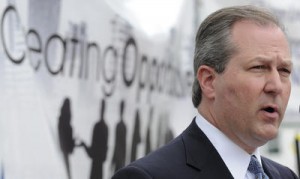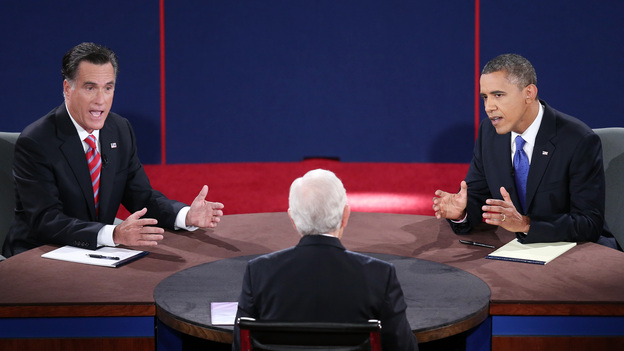President Obama and Mitt Romney painted a bleak portrait of each other’s leadership on the world stage Monday night, using their final debate before a feverish two-week blitz of campaigning to tout their commander-in-chief credentials.
To hear Romney tell it, the president has presided over a steady decline in American influence that has emboldened enemies like Iran. To hear Obama, the Republican nominee would confuse the rest of the world with a foreign policy that is “all over the map.”
The two met for a debate focused on foreign policy, though it often veered to domestic issues like the economy and taxes. In contrast to the last debate where Obama and Romney paced and circled each other throughout, the rivals were seated next to one another onstage in Boca Raton, Fla. It made for a less confrontational setting, but the tone was no less tense.
Obama accused Romney of pushing a foreign policy that’s either flat-out “wrong” or some version of what the president himself has already done, only “louder.” Romney accused the president of projecting “weakness” on the world stage, whether through his so-called “apology tour” overseas or his policy on Iran.
Romney ripped President Obama’s foreign policy at the start of Monday night’s debate, claiming the president’s strategy has not quelled the Al Qaeda threat.
“It’s certainly not on the run. It’s certainly not hiding,” Romney said. “This is a group that is now involved in 10 or 12 countries.”
Romney commended Obama for ordering the raid that killed Usama bin Laden and other strikes on Al Qaeda leaders, but he said “we can’t kill our way out of this mess.” He said Al Qaeda remains an “enormous threat,” despite Obama’s claims that the terror group is on the path to defeat.
Obama, though, countered that “Al Qaeda’s core leadership has been decimated.” And he sought to portray Romney as someone who would be an unsteady leader on the world stage. He accused Romney of having a strategy that is “all over the map.”
Obama was tough on Romney from the outset, accusing him of having poor judgment and antiquated views on foreign affairs.
“I'm glad that you recognize that Al Qaeda is a threat, because a few months ago when you were asked what's the biggest geopolitical threat facing America, you said Russia, not Al Qaeda,” Obama said. “The 1980s are now calling to ask for their foreign policy back.”
Obama went on to say that, on foreign policy, “every time you've offered an opinion, you've been wrong.”
Romney fired back, “attacking me is not an agenda.” He accused Obama of looking at countries like Russia through “rose-colored glasses.”
The 90-minute debate offered perhaps the last chance for either candidate to shake up the race in any significant way, with two weeks to go until Election Day. The face-off at Lynn University was moderated by Bob Schieffer.
The presidential debates this month have been among the most consequential in modern campaign history. Romney entered the debates as the slight underdog in most polls, but since his opening performance has surged to pull even with or ahead of the president.
Via: Fox News
Continue Reading...


















